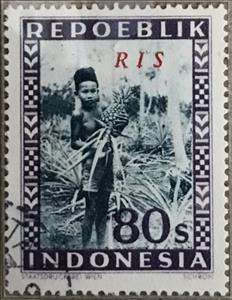Stamp: Boy with Pineapple (Indonesia 1949)
Boy with Pineapple (Indonesia 1949)
01 January (Indonesia ) within release Vienna Printings - RepOEblik - RIS goes into circulation Stamp Boy with Pineapple face value 80 Indonesian sen
| Stamp Boy with Pineapple in catalogues | |
|---|---|
| Dai Nippon: | Dai: ID 50-18l |
Stamp is square format.
Overprint (RIS) in redAlso in the issue Vienna Printings - RepOEblik - RIS:
- Stamp - Airplane and Flag face value 4.50;
- Stamp - Airplanes Breaking the Blockade face value 30;
- Stamp - Airplanes Breaking the Blockade face value 1;
- Stamp - Airplanes Breaking the Blockade face value 1;
- Stamp - Arrival of a Ship face value 50;
- Stamp - Bannerman and Airplane face value 5;
- Stamp - Bannerman and Airplane face value 5;
- Stamp - Bannerman and Airplane face value 5;
- Stamp - Bannerman and Airplane face value 1;
- Stamp - Blockade Airplane face value 2.50;
- Stamp - Boy with Pineapple face value 80;
- Stamp - Buffalo Canyon face value 75;
- Stamp - Construction of Great Postal Road, Java face value 15;
- Stamp - Discussing Pilots face value 1;
- Stamp - Djanger Dancer from Bali face value 30;
- Stamp - Hot Springs, Java face value 2.50;
- Stamp - Hot Springs, Java face value 1.50;
- Stamp - Lake Region face value 40;
- Stamp - Mosque in Medan face value 2;
- Stamp - Mountain Landscape face value 60;
- Stamp - Pilots face value 30;
- Stamp - Plane Over Lakes face value 4.50;
- Stamp - Plane Over Lakes face value 4.50;
- Stamp - President Sukarno face value 25;
- Stamp - President Sukarno face value 25;
- Stamp - President Sukarno face value 25;
- Stamp - President Sukarno face value 25;
- Stamp - Red Cross Airplane face value 50;
- Stamp - Red Cross Boeing Aircraft face value 20;
- Stamp - Red Cross Nurse with Wounded Soldier face value 7.50;
- Stamp - Rice Farmers face value 35;
- Stamp - Ships Breaking the Blockade face value 10;
- Stamp - Ships Breaking the Blockade face value 25;
- Stamp - Ships Breaking the Blockade face value 25;
- Stamp - Special Services face value 40;
- Stamp - Sumatra Mountain face value 50;
- Stamp - Sumatra Mountain face value 50;
- Stamp - Unloading of a Blockade Vessel face value 15;
- Stamp - Unloading of a Blockade Vessel face value 60;
- Stamp - Vice President M. Hatta face value 10;
- Stamp - Vice President M. Hatta face value 10;
- Stamp - Vice President Muhammad Hatta face value 10;
- Stamp - Vice President Muhammad Hatta face value 10;
- Stamp - Warplane face value 10;
- Stamp - Watching Soldier face value 20;
- Stamp - Watching Soldier face value 20;
|
Data entry completed
53%
|
|
|---|---|
| Stamp Boy with Pineapple in digits | |
| Country: | Indonesia |
| Date: | 1949-01-01 |
| Print: | Photogravure |
| Emission: | Regional |
| Format: | Stamp |
| Face Value: | 80 Indonesian sen |
Stamp Boy with Pineapple it reflects the thematic directions:
Biologically, a child (plural: children) is a human being between the stages of birth and puberty. The legal definition of child generally refers to a minor, otherwise known as a person younger than the age of majority. Child may also describe a relationship with a parent (such as sons and daughters of any age) or, metaphorically, an authority figure, or signify group membership in a clan, tribe, or religion; it can also signify being strongly affected by a specific time, place, or circumstance, as in "a child of nature" or "a child of the Sixties". There are many social issues that affect children, such as childhood education, bullying, child poverty, dysfunctional families, child labor, hunger, and child homelessness. Children can be raised by parents, by fosterers, guardians or partially raised in a day care center.
In botany, a fruit is the seed-bearing structure in flowering plants (also known as angiosperms) formed from the ovary after flowering. Fruits are the means by which angiosperms disseminate seeds. Edible fruits, in particular, have propagated with the movements of humans and animals in a symbiotic relationship as a means for seed dispersal and nutrition; in fact, humans and many animals have become dependent on fruits as a source of food. Accordingly, fruits account for a substantial fraction of the world's agricultural output, and some (such as the apple and the pomegranate) have acquired extensive cultural and symbolic meanings. In common language usage, "fruit" normally means the fleshy seed-associated structures of a plant that are sweet or sour, and edible in the raw state, such as apples, bananas, grapes, lemons, oranges, and strawberries. On the other hand, in botanical usage, "fruit" includes many structures that are not commonly called "fruits", such as bean pods, corn kernels, tomatoes, and wheat grains. The section of a fungus that produces spores is also called a fruiting body.
Flora is the plant life occurring in a particular region or time, generally the naturally occurring or indigenous—native plant life. The corresponding term for animal life is fauna. Flora, fauna and other forms of life such as fungi are collectively referred to as biota. Sometimes bacteria and fungi are also referred to as flora, as in the terms gut flora or skin flora.



